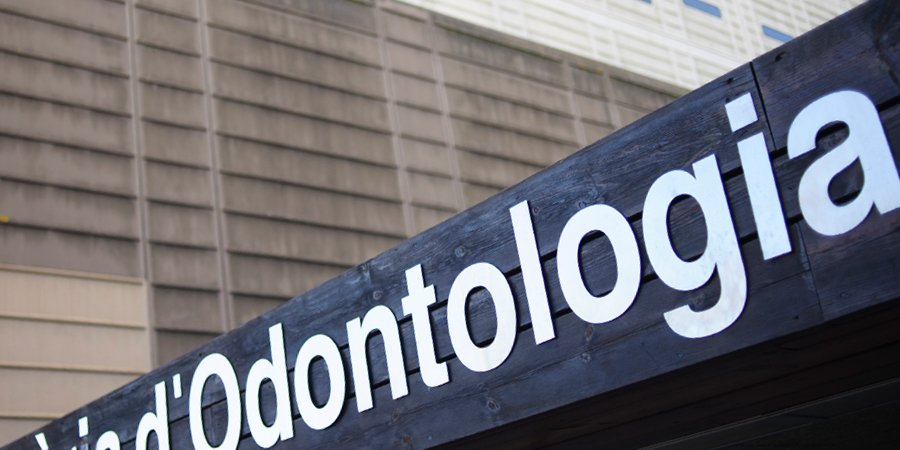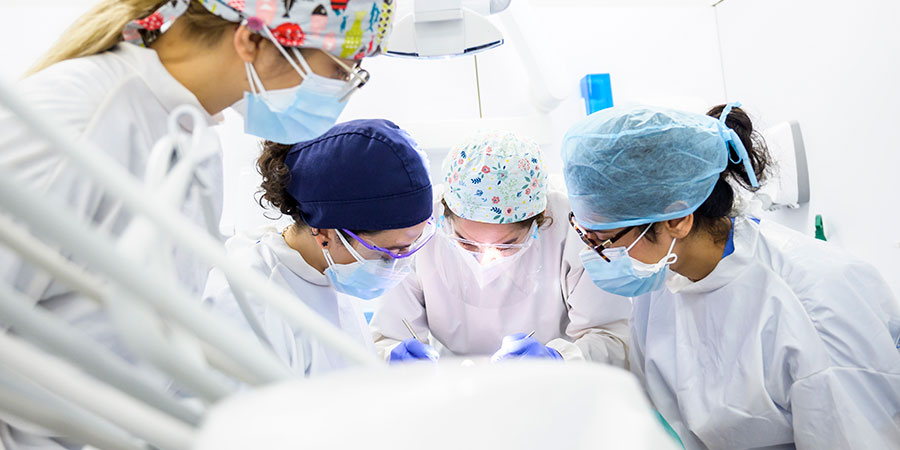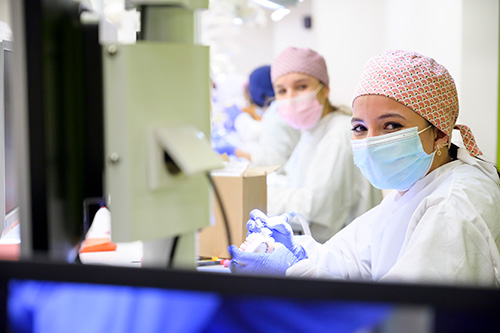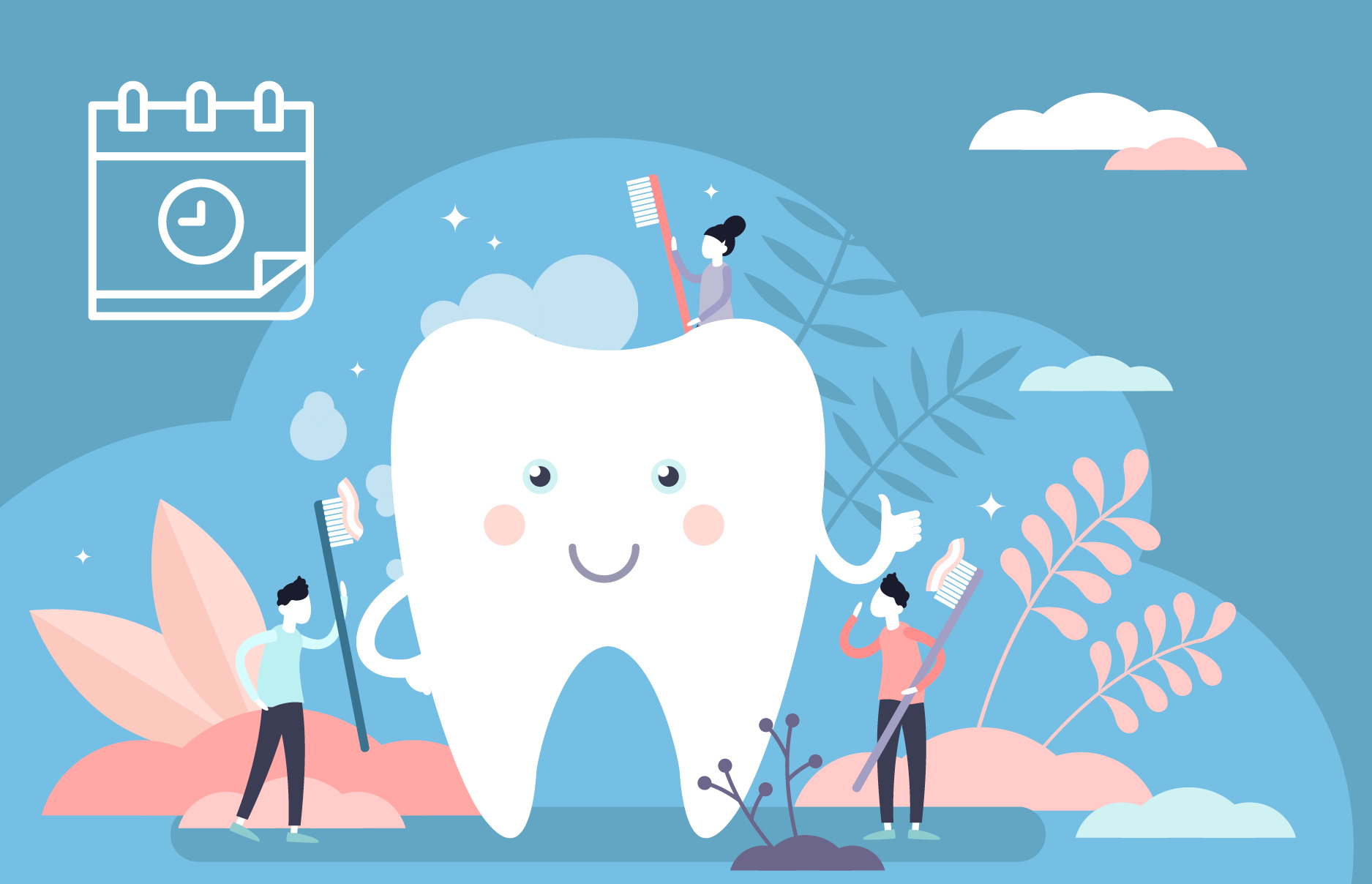University Clinic of Dentistry
- 93 504 20 30
- clinica@uic.es
Campus Sant Cugat. C/ Josep Trueta, s/n,
Health Area, 08195, Sant Cugat del Vallès (Barcelona)
- Monday to Friday 8.00 a.m. to 10.00 p.m.
- Saturdays 8.00 a.m. to 2.00 p.m.
- Closed: From August 24 to September 1.
Facilities
Our University Dental Clinic (CUO) has 88 dental cubicles all equipped with cutting-edge technology. In addition, we have cubicles prepared for performing surgeries, administering conscious sedation, attending special needs patients, etc.
We also have a preclinical laboratory with 95 dental simulators and digital radiology. This laboratory allows students to practice dentistry skills before they do dental work on patients. Acquisition of the Simodont Dental Trainer (virtual reality simulator) is particularly important. This simulator provides students with a virtual reality environment during preclinical practices and helps improve training and teaching.
We also have the prosthetic laboratory equipped with the latest CAD-CAM technologies that provides service to every area of dentistry. This laboratory has, among others, the following devices:
- Intra-oral scanners
- 3D printers
- Dental design software programmes
- Clinical microscopes
For additional testing, we have intra-oral radiology and digital imaging in each cubicle. Additionally, each cubicle has integrated television equipment for transmitting interventions.
We also have two diagnostic imaging rooms, with three 3D x-ray units, which can be used for orthopantomography, lateral and frontal skull teleradiography and CBCT/CT scanner.
The CUO facilities also have a digital treatment planning room, a computerised storage room for the delivery and collection of material and a complete sterilisation service for all medical equipment and instruments used.
The Clinic also has a dental research laboratory.
And, in addition to all these facilities, equipment and devices, the University has agreements with the dental, pharmaceutical and medical industries to promote R+D+I (Research, Development and Innovation).
Team
Management
Sr. Josep Maria García Navas
Care Team
Dr. Oriol Cantó Naves
Medical director of CUO UIC Barcelona
Specialties
- Periodontics
- Implants
- Oral Surgery
- Orthodontics
- Paediatric dentistry
- Prosthesis
- Endodontics
- Preventative Dentistry
- Comprehensive dentistry
- Geriatric dentistry
- Oral medicine
- CMD
The discipline of periodontics is dedicated to the prevention, diagnosis and treatment of periodontal infections such as gingivitis, periodontitis and peri-implant diseases (mucositis and peri-implantitis) as well as the rehabilitation of missing teeth by means of implants. Aesthetic treatments for this area include gum retractions or correction of gingival smiles.
Periodontal treatment improves the oral health conditions of affected patients, as well as their quality of life, and contributes to the survival of natural teeth for as long as possible. The treatment includes oral hygiene instructions adapted to each patient and the elimination of tartar and bacterial deposits by periodontal debridement (scaling and root planing). More advanced cases may require surgical treatment to eliminate residual inflammation of tissues and sometimes tissue regeneration.
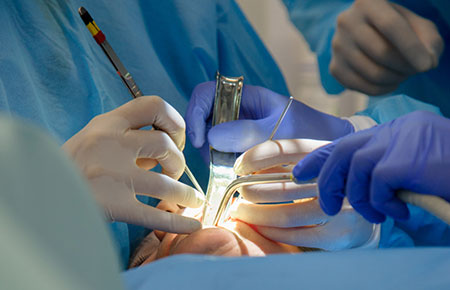
Periodontics specialists also perform the rehabilitation of edentulous sections by dental implants and biomaterials of the highest quality.
It is important to note that periodontitis is the primary cause of tooth loss in the world population and that in its advanced stages it causes a lot of inflammation that moves throughout the body, and creates a greater risk of heart attacks, worse control of diabetes or premature birth, among others.
Oral implantology deals with the restoration of lost teeth by installing artificial titanium “roots” called implants. Sometimes there is not enough bone in the jaws for placement. This specialisation provides all the necessary treatments to recover the volume of missing bone. The incorporation of digital and 3D technology allows high precision planning and execution of these treatments.
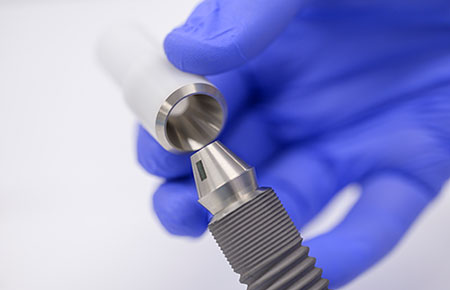
Oral surgery is responsible for diagnosing and solving any mouth alterations and pathologies that are disposed to surgical treatment. Among these we can highlight: extraction of affected dental pieces, the removal of jaw lesions and cysts, the elimination of tumours in the mouth and lips or the treatment of braces.

Dental orthodontics and dentofacial orthopaedics is the specialisation of dentistry that is dedicated to the diagnosis, supervision, prevention of problems and treatment of bad dental positioning, dental occlusion and maxillary bone deformity in children, adolescents and adults.
Orthodontic care begins with temporary teething and mixed dentition. It continues through permanent dentition with the control, detection of problems and treatment of alterations in jaw development in both children and growing adolescents. The ultimate goal of orthodontics is to create the best occlusal relations between teeth in a well-functioning environment with good physiological adaptation. This should be within the framework of good dental and facial aesthetics, maximum stability, and from an interdisciplinary perspective, with the best possible results in all patients from children to adults.
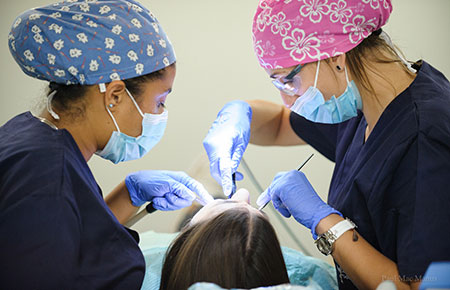
For 20 years the Department of Orthodontics has had a postgraduate Master’s Degree in Orthodontics that is accredited by the European Orthodontic Society. Its teaching team consists of renowned orthodontists trained in Spain, Europe and in the United States.
Paediatric dentistry is the branch of dentistry dedicated to the prevention and treatment of oral pathologies from the earliest childhood to the age of twelve. It is responsible for exploring the oral cavity of children and detecting possible alterations, as well as applying an individualised procedure and treatment.
Nowadays, the first visit to the paediatric dentist is recommended after the eruption of the first tooth (approximately about six months). The importance of this early visit allows us to offer more preventive guidelines and diagnose any abnormalities as best as possible and thus avoid future problems.
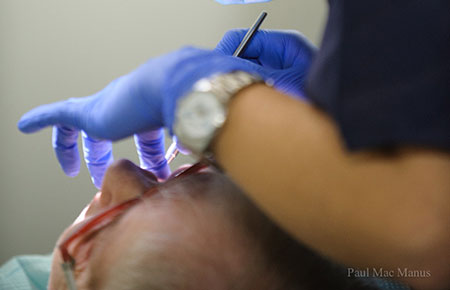
The University Clinic of Dentistry (CUO) has the most innovative therapies and technological advances to offer advanced and highly specialised cures to the littlest patients. All this with the objective of good oral health to avoid dental problems in adult life.
Tips for proper oral hygiene
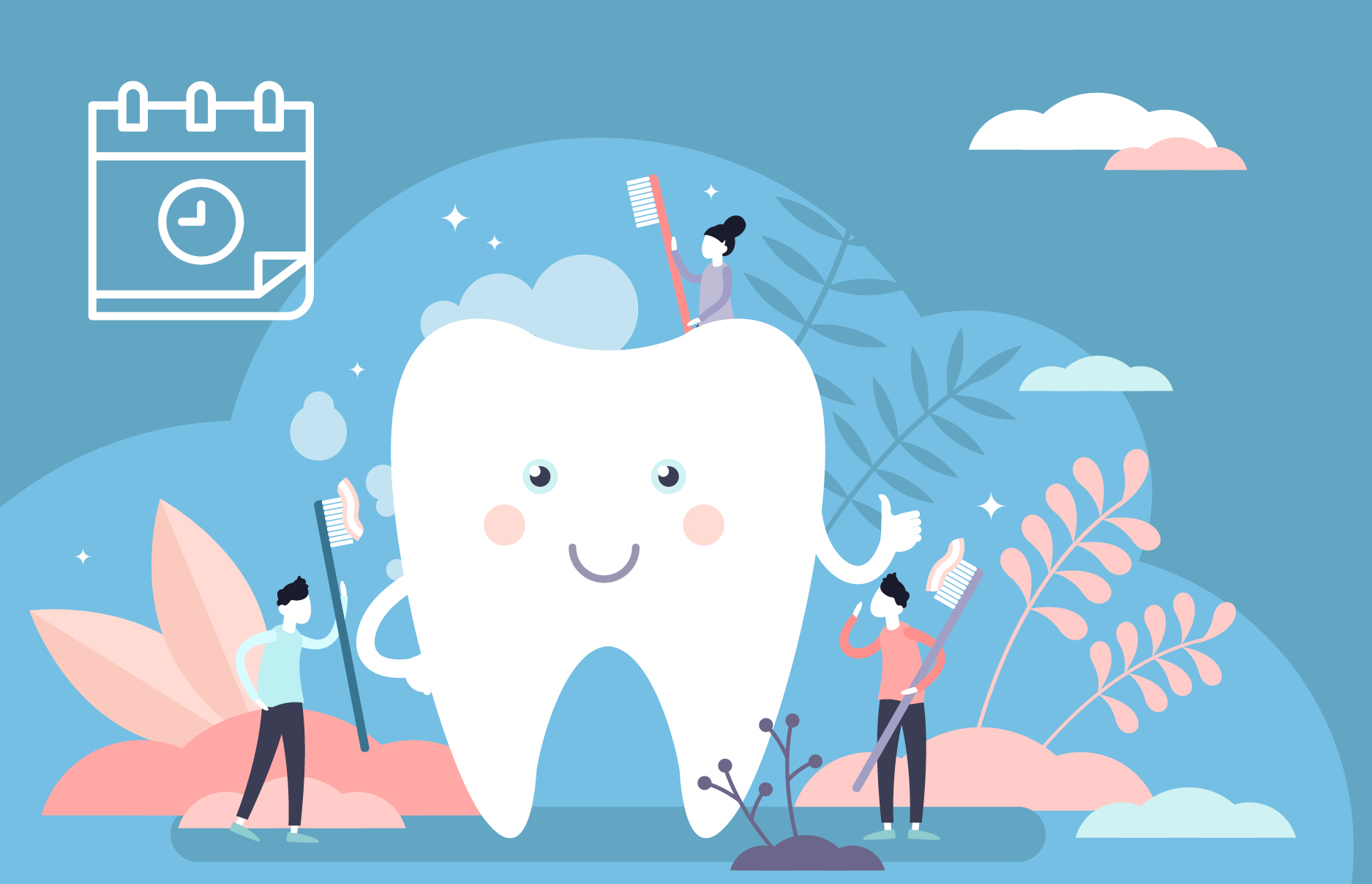
Our paediatric dentists advise you to brush your teeth at least twice a day.
As the name suggests, the Dental Restoration Department provides a series of services to restore dental function which includes chewing, phonation and aesthetics.
Experts in this area treat disorders and jaw joint pain while also performing treatments such as simple fillings and fixed and removable prostheses on teeth and implants. The intervention of specialists in restorative dentistry includes large-scale rehabilitation of very deteriorated oral cavities, and aesthetic treatments involving bleaches or veneers.
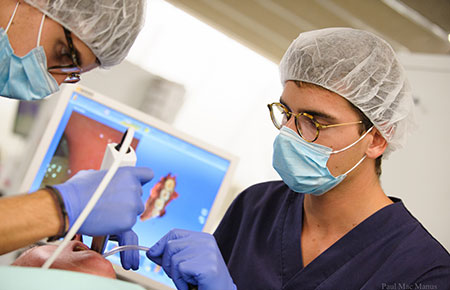
The intensive use of digital techniques and equipment, together with the wide experience of the teachers, make the CUO a reference centre for large-scale restorations with minimal time and discomfort, and maximum predictability of treatment and patient comfort.
Endodontics is the dental branch that mainly deals with the morphology, physiology and pathology of the dental pulp, as well as the tissue surrounding the root. Knowledge of the dental pulp is essential, since it contains blood vessels, nerves and connective tissue that feed the tooth during its formation. In the face of a pulpoperiapical pathology, the most common procedures are endodontic treatments because they allow to maintain natural dentition with full functionality.
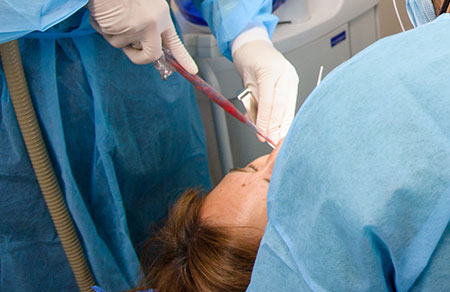
Specialists in this area of the CUO are responsible for preventing or curing any pathology of pulp or periapical origin with the ultimate goal of saving the tooth and keeping it healthy as long as possible. The treatments performed are very diverse, such as non-surgical retractions, apical surgeries, intentional reimplants and auto-transplants. In addition, they have everything necessary to successfully carry out the treatment of different dental injuries.
The object of this important specialisation of dentistry is to prevent oral diseases and to organise revision plans to maintain good oral cavity health and restorations that are undertaken.
The professionals of the CUO offer patients personalised dental care plans and periodically remind them of the need to go for review. They also advise them on the best techniques and products to reduce the need for complex restorative treatments.
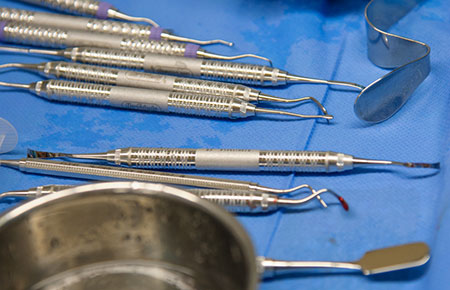
This area deals with overall oral health, taking care of oral hygiene, maintaining gum health, exodontics, restoration of teeth with cavities, oral prosthetic rehabilitation, etc. The professionals in this area are responsible for conducting a thorough examination and presenting the diagnosis with the most appropriate options for each case. Treatments that require a greater specialisation will be referred to professionals in the corresponding areas, always with a joint and comprehensive supervision by all teams.
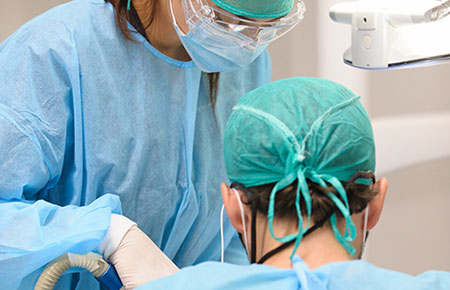
Among the services provided by the University Clinic of Dentistry is the care of elderly patients and those who have special needs. Elderly patients are an increasingly large group who often have problems with mobility, mental deterioration, economic limitations and isolation. On the other hand, they suffer much more from chronic or degenerative diseases that limit or condition treatments. In these circumstances, the dentists who treat them must know their characteristics, limitations and needs. Specialists trained in the management of people with medical complications or with problems associated with ageing are required.
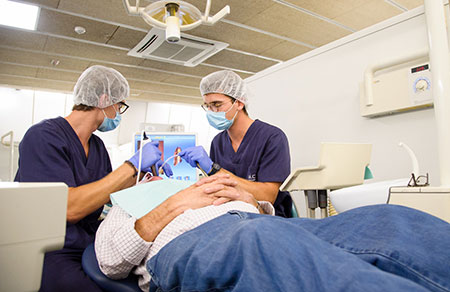
The Dental Clinic has a suitable group of experts, techniques and equipment for these specific needs, provided by the only master’s degree in gerodontology in Spain. Within the university clinic, on an outpatient basis, or in the relevant operating rooms, these patients receive care and prevention guidelines. If necessary, these include: treatment under general anaesthesia; conscious sedation; techniques with nitrous oxide; and the use of minimally invasive procedures without the use of anaesthesia or the usual rotary instruments.
This approach is especially important in patients with congenital disorders, non-cooperative or special needs patients whose caregivers know the importance of maintaining good oral health and the main problems that can produce oral disorders.
The Oral Medicine Unit of the University Clinic of Dentistry is responsible for the detection, diagnosis, treatment and monitoring of lesions of any kind that appear in the mucosa of the oral cavity, not only locally but also as a consequence of general diseases whose signs or symptoms are reflected in the mucosa of the mouth.
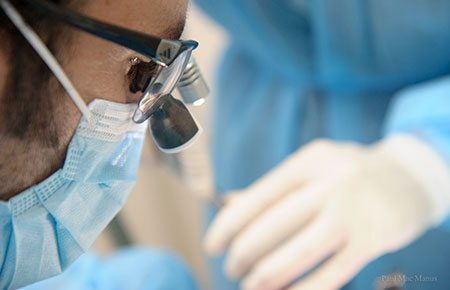
The group of experts in oral medicine has extensive experience in the management and resolution of cases ranging from small lumps, ulcers or blisters, to complex pathologies, some highly destructive, such as cancers of the oral cavity. When needed, biopsies, cytology or other types of diagnostic tests are performed that are intended to rule out possible malignant lesions quickly and effectively with laboratory analysis. Finally, the lesion is removed surgically or through prescribed medication. Our patients may be referred from any medical specialisation or general medicine, different master’s programmes, or dentists who work in the university clinic.
Craniomandibular dysfunction and orofacial pain is the branch of dentistry that focuses on diagnosing and treating pathologies that affect the head and neck region, such as the temporomandibular joint, the muscles of the face and neck, and cranial nerves and blood vessels responsible for sensitivity and perception.
The pain associated with each of these structures begins acutely and over time becomes chronic, which hinders its total healing and decreases the quality of life of the patient.
Nowadays, the development of these pathologies has a high incidence within the population since it is related to the psychological component of the patient (levels of stress, anxiety, depression) and also to poor quality of sleep (snoring, sleep apnea).
At the same time, overactivity of the musculature in the form of tightness and wear can cause damage at the dental level, which is reflected in the appearance of awake or sleep bruxism.
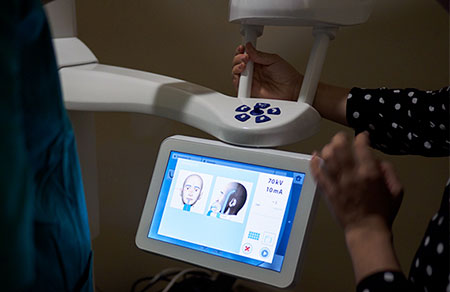
In the Master’s Degree in Craniomandibular Dysfunction and Orofacial Pain, we diagnose all these pathologies from a multidisciplinary field within the management of dentistry.
The patient can receive multidisciplinary treatment of physiotherapy, psychology, correction of bad sleep or dental habits. The patient may be treated by the dentist through splints, mandibular advancement devices for sleep pathology, muscle and joint infiltrations, rehabilitative treatments and occlusal adjustments, neuromuscular deprogramming, individualised pharmacotherapy, etc. always from a comprehensive approach.
What do we offer
The University Clinic of Dentistry offers comprehensive and personalised care to patients of all ages, with a human team that has a clear vocation for service to improve the people’s oral health.
Being a university clinic, we can offer competitive prices adapted to the needs of society. And our patients also have the opportunity to participate in top-tier clinical studies.
Services
- Personalised care with treatments adapted to each patient, from 3 months of age, in different dental specialties.
- First visit free of charge
- Extended clinic hours
- All specialties within the field of oral health
Contact
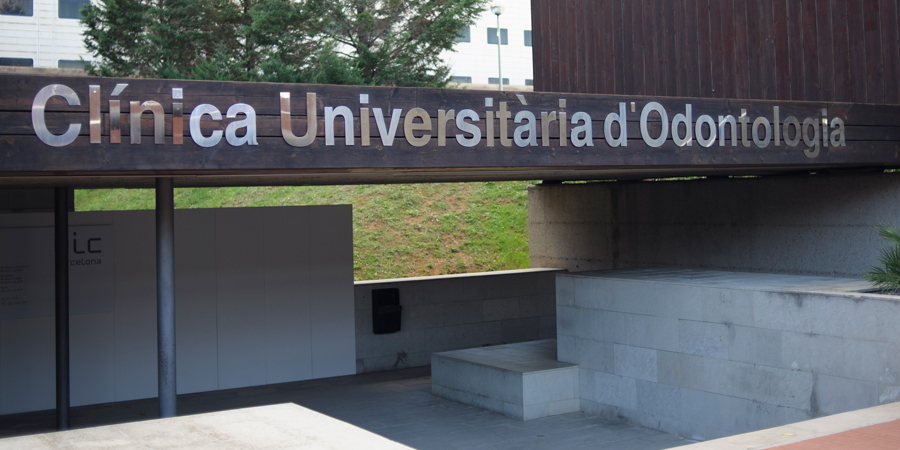
Clinic hours
Monday to Friday 8.00 a.m. to 10.00 p.m. / Saturdays 8.00 a.m. to 2.00 p.m.
* Except for Easter holidays, Christmas holidays and all Saturdays from June to August
Clinic hours in August: Monday to Friday 8.00 a.m. to 2.00 p.m.
Contact
T. 93 504 20 30
Email: clinica@uic.es
Location
Campus Sant Cugat
C/ Josep Trueta, s/n
Health Area
08195 Sant Cugat del Vallès (Barcelona)
